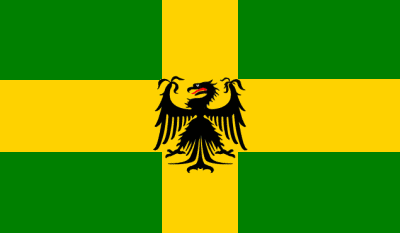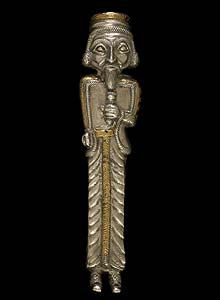Jugenskaja

|
[[Image:{{{coat of arms}}}|100px]] |
| Feudal Status: | County |
| Capital: | Jugensk |
| Largest Cities: | Jugensk |
|
| |
| Local Leadership Title: | The Count |
| Local Government: | Laschist Autocracy (Laqi Populist) |
| Current leader: | Nickolas Turner |
|
| |
| Local language: | English, Laqi |
| Local Religion: | Orthodox,Cedrism & Jewish minorities |
History & Culture
The County of Jugenskaja is a relatively new county. A central county within the Barony of K'Tzuni, it is land locked and is currently maintained by Count Nickolas Turner.
Thousands of years ago (around 12 ASC), a nomadic tribe resided here called the Juuk's, which roughly translates into southern peoples in their native language. The tribe itself was nomadic, but found the rich farmland of this land to be superior to that of the surrounding land. For the next thousand years, mingling with neighboring tribes and civilizations the modern people of Jugenskaja came about.
The Juuks became known for their fine metal work, as natural deposits of chromium were found throughout the land. Lavish statues, jewelry and other trinkets made the Juuks a center of great wealth and trade. Northern tribes traded their gold for the Juuks artistry, thus allowing them to incorporate gold into their works, as seen below.
The small statuette of a Juuk chieftain above is made of pure chromium with gold accents, and probably one of the most valuable items found in recent excavations; dated around 49 ASC.
By the mid 70's a trade route was established with people from the northern Benacia region, bringing hearty grains to the Juuks. This in turn gave the Juuks a reputation for distilling fine spirits of exceptional strength.
The 90's ASC
As the Juuks grew in numbers they spread throughout most of what is now Jugenskaja, some of the surrounding counties such as eastern Highpass, southern and central Caverden and small portions of northern most Lywind. In times before Shireroth, the Juuk Empire was feared by most neighboring tribes for their feirce warriors and rather modern siege machines.
Early 100's-200's
In 102 ASC, Central tribes began rising in power, and over took the Juuks when they tried to conquer what is now Woodshire. While the Juuks suffered a great defeat at the hands of the central tribes, this gave birth to a federation of tribes.
As always, the Juuks came to dominate, holding the most authority in the elder councils. Essentially they believed they alone possessed the divine right to rule through their holiest of Gods H'Graa. They eventually dominated the lands once again, and much of what is now modern Brookshire.
Soon after the conquests, priests from lands unknown began spreading the word of Orthodox Christianity. Village by village people converted. Soon word reached the chieftain; he became intrigued by the religion and accepted it as his own. It is unknown as to he date of the official conversion, but it is believed to be around 134.
Holy War Of 220
Many people still stuck to the old ways and eventually created turmoil within the Juuk lands. Warriors still loyal to the acolytes of H'Graa rallied and attempted a siege on the chieftains castle. While unsuccessful, those loyal to the chieftain began a campaign to rid the land of its former religion, declaring it heretical.
260 & After
The last chieftain (before being absorbed into Shireroth) died. Since he had no heir (his only son was killed by warriors loyal to God), the Juuk nation fell into turmoil, the old pagan ways were restored and had almost as many worshipers as Orthodoxy. When Shireroth absorbed the lands, both religions were established as official religions within the Barony.
